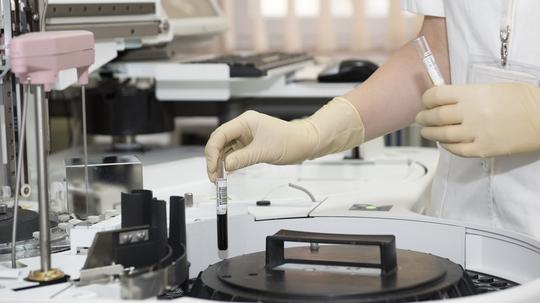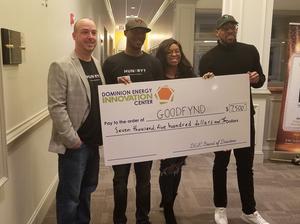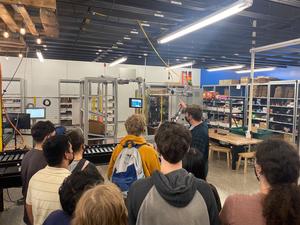
After taking 3D printing courses in graduate school at Virginia Tech, Elliot McAllister wrote a paper on the potential of using them to design microchips and other small devices. Little did he know, that idea might forever alter the face of medical test development.
For 30 years, little has changed for the people looking to develop new medical tests, especially those including microfluidics. The process involves creating microchips that allow a small amount of fluid in, perform a reaction, and release another fluid – like an at-home pregnancy test or strep throat test.
These “lab-on-a-chip” systems have been used by researchers for decades, but designing such chips takes multiple iterations before producing something patentable. After coming up with the idea, having the design masked and molded at separate labs, and constructing and aligning the small parts by hand, it could take eight weeks and thousands of dollars to run one test.
When McAllister wrote his research paper, there were about 15 DIY kits on the market for 3D printers that had many of the same specs as high-end printers from large companies. But even those couldn’t work at the microscopic level necessary for microfluidics testing.
“We couldn’t do it with 3D printers then, but there was a roadmap to get there,” he said. And related software needed to greatly improve to reach that resolution. “That was my final paper for that class, so I wrote it and sort of forgot about it.”
Several years and startup jobs later, the Blacksburg entrepreneur returned to his thesis and took the plunge to turn it into a company: Skyphos Technologies.
Skyphos developed a 3D-printing process for microfluidics using lab-on-a-chip devices, allowing faster, cheaper testing in hopes of speeding up the process of discovering new technologies.
After self-funding the startup and developing the printing technology, including the physical printer, materials and related software, McAllister graduated in October last year from Roanoke accelerator RAMP with a finished product, pending patents and three customers lined up.
“As soon as you have a design drawn up, you can make a chip and have it running in an experiment in an hour.”
Skyphos also took part in the Lighthouse Labs Bootcamp accelerator last month, right after snagging an investment for undisclosed terms from Northern Virginia's Center for Innovative Technology, one of the state's most active growth-stage investors.
Otherwise, the company is still mostly bootstrapped, McAllister said, with a sales strategy he believes will allow it to do so. The first order shipped late last year, and he expects to quintuple both his client list and revenue every month for the remainder of 2019.
How it works
Skyphos makes the first commercial 3D printers with resolutions down to five micrometers, and has plans to push it to one micron by yearend. Labs and researchers capable of 3D printing will benefit from this technology by enabling faster iterations as well as pushing the boundaries of microfluidic chip technology, in which they don’t need a cleanroom or other high cost settings to conduct their research and development of the chips.
The technology, McAllister said, eliminates 90 percent of the waiting time for product development, meaning a five-year cycle can be condensed to six months.
“As soon as you have a design drawn up, you can make a chip and have it running in an experiment in an hour.”
The company, which currently operates as a service provider, allows researchers to print microchips on demand, outside of a cleanroom, bypassing months of development time and hundreds of thousands of dollars per device. Its target customers at the outset are mostly startups that need to get a product to market before fizzling out.
What’s next
For now, the startup is a one-man operation in McAllister's repurposed garage. But to accommodate the anticipated growth, Skyphos plans to hire an applications engineer and a handful of other employees, hoping to reach six by yearend.
On the technology side, McAllister said the company should – by yearend – be able to hit a 2-10 second process time to make chips. Right now, competitors’ processes take 4-15 minutes per layer, and most chips include two or three layers.
Skyphos also plans to start selling the printer itself, which he said would retail around $65,000-$85,000 including software. But that second line of business will only begin when the technology is airtight.
“We want to fall on our face in our own homes without anyone seeing us first,” McAllister said. “So we launched the service this year, and next year we’re launching the printer brand.”
The startup is talking with potential customers in the U.K., Netherlands, India, U.S. and New Zealand, he said, but he hopes the tech can bring manufacturing jobs back to the States.
Skyphos’ breakthrough also has implication off-planet, as NASA looks for life beyond Earth. To find microbial life, you need a flexible testing system. Because Skyphos’ process is digital, it’s innately flexible, so researchers can complete an experiment, upload a new design, print it and repeat.
“Looking at our contribution to this branch of science, it trumps everything out there,” McAllister said about the implications of his tech. “3D printing has all the aspects you want.”
To check out moonshots in all 13 Inno markets, click here.




